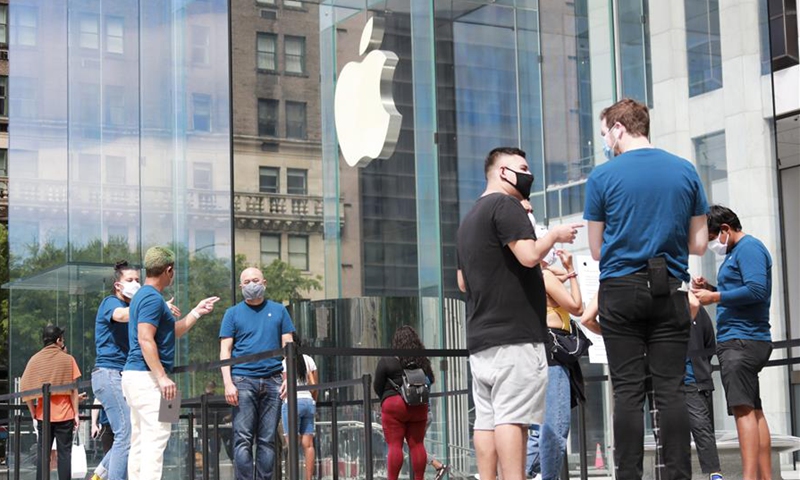Apple kicks off WWDC virtually, new versions of operating systems announced
Source:Xinhua Published: 2020/6/23 14:12:05

A staff worker serves a customer outside an Apple store on Fifth Avenue of New York City, the United States, June 17, 2020. (Xinhua/Wang Ying)
Apple on Monday kicked off its first all-online Worldwide Developers Conference (WWDC) amid the COVID-19 pandemic, bringing together developers and fans from across the globe for the special virtual event filled with announcements of the company's new versions of operating systems for its various platforms and products.
"iOS 14 transforms the most iconic elements of the iPhone experience, starting with the biggest update we've ever made to the Home Screen," said Craig Federighi, Apple's senior vice president of Software Engineering.
The iOS 14's Home Screen pages can display widgets that are customized for work, travel, sports, entertainment, and other areas of interest.
App Library will automatically organize all of a user's apps into one simple, easy-to-navigate view, and intelligently surface apps that may be helpful at the moment.
With Picture-in-Picture support, iPhone users can watch a video or take a FaceTime call while using another app.
Maps in iPhone has added new cycling directions, electric vehicle routing, and curated Guides. Cycling directions take into account elevation, how busy a street is, and whether there are stairs along the route. Electric vehicle routing adds charging stops along a planned route based on current vehicle charge and charger types.
The iPadOS 14 introduces an all-new compact design for incoming FaceTime and phone calls, Siri interactions, and Search to help users stay focused on the task at hand, the company said.
New Apple Pencil features, including Scribble for iPad, deliver a new way to work with handwritten notes, and ARKit 4 delivers a new Depth API that allows developers to create more powerful features in their apps.
Siri now appears at the bottom of the iPad's screen when activated in the new version, allowing users to seamlessly reference information onscreen while making a request, and it quickly gets out of the way when launching other apps or controlling music.
Search on iPad has also been rebuilt from the ground up with iPadOS 14 and is now the one place to "quickly find practically anything," from locating and launching apps to accessing contacts, files, and quick information.
iPadOS 14 brings Scribble to iPad with Apple Pencil, allowing users to write in any text field, where it will automatically be converted to typed text, making actions like replying to an iMessage or searching in Safari. Scribble will initially offer support for English, traditional and simplified Chinese, and mixed Chinese and English.
According to Federighi, macOS Big Sur is a major update that advances the combination of the power of UNIX with the ease of use of the Mac, and "delivers our biggest update to design in more than a decade."
The new features of the desktop operating system include a customizable start page, tabs, translation, and newly-added privacy report.
In the biggest update to Safari since its original launch in 2003, the browser can provide industry-leading speed and battery life, the company said.
Apple said watchOS 7 has more health, fitness features. The new operating system offers updates to faces for more personalization and access to favorite apps. With watchOS 7, Apple Watch introduces sleep tracking, taking a holistic approach to sleep by providing valuable tools to help users get the desired amount of sleep, get to bed on time, and create a pre-bedtime routine to meet their sleep goals.
"We're energized by the positive impact Apple Watch is having on our customers and are excited to deliver meaningful new tools that support their health, fitness, and wellness," said Jeff Williams, Apple's chief operating officer.
"WatchOS 7 brings sleep tracking, automatic handwashing detection, and new workout types together with a whole new way to discover and use watch faces, helping our users stay healthy, active, and connected," he added.
Apple also introduced the transition of Mac to its custom silicon "to deliver industry-leading performance and powerful new technologies".
"Today we're announcing our transition to Apple silicon, making this a historic day for the Mac," said Tim Cook, Apple's CEO. "Apple silicon will make the Mac stronger and more capable than ever. I've never been more excited about the future of the Mac."
The company plans to ship the first Mac with Apple silicon by the end of the year and complete the transition in about two years. It will continue to support and release new versions of macOS for Intel-based Macs for years to come, and has new Intel-based Macs in development.
The WWDC 2020 kicked off on Monday and will run virtually until Friday.
Posted in: COMPANIES